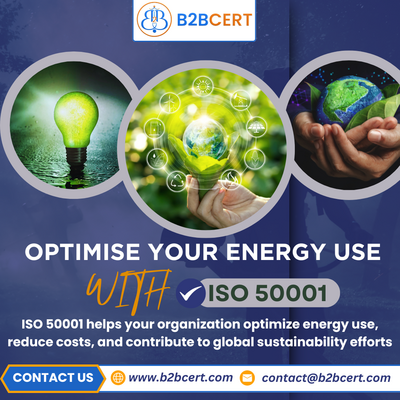What Types of Records and Documentation Are Required Under ISO
-
ISO 50001 is the international standard for Energy Management Systems (EnMS). It provides a framework to manage energy performance, reduce energy costs, and enhance sustainability. One of the most crucial aspects of implementing ISO 50001 is proper documentation. This ensures that all processes, responsibilities, and energy performance data are clearly defined, maintained, and auditable.
In this blog, we’ll explore the key types of records and documentation required under ISO 50001, especially for organizations pursuing ISO 50001 Certification in Bangalore.
1. Energy Policy Document
The cornerstone of an energy management system is the Energy Policy. This is a formal, documented commitment by top management to improve energy performance continuously. The policy must be communicated within the organization and reviewed periodically.
2. Scope and Boundaries of the EnMS
Organizations must define and document the scope and boundaries of their EnMS. This includes the physical and organizational limits within which the EnMS will operate. For example, a company in Bangalore may choose to implement ISO 50001 only in its manufacturing unit rather than the entire corporate office.
3. Energy Review Records
Conducting an energy review is a critical step. The review includes:
-
Analysis of current energy consumption and use
-
Identification of significant energy uses (SEUs)
-
Evaluation of past and present energy performance
-
Determination of energy performance indicators (EnPIs)
These reviews must be documented in detail and kept as ongoing records.
4. Energy Baseline (EnB)
ISO 50001 requires organizations to establish and maintain an Energy Baseline. This serves as a reference point to track performance improvements. The baseline must be documented, including the methodology and relevant data used to set it.
5. Energy Performance Indicators (EnPIs)
EnPIs are metrics that help measure improvements in energy performance. These indicators must be defined, documented, and regularly monitored to ensure that the organization is moving towards its energy goals.
6. Objectives, Targets, and Action Plans
The organization must set energy objectives and targets based on the energy review findings. These should be SMART (Specific, Measurable, Achievable, Relevant, Time-bound) and documented along with the associated action plans to meet them.
7. Competence, Training, and Awareness Records
Employee competence in energy-related roles is vital. Organizations must keep records of:
-
Training programs
-
Skills assessments
-
Employee awareness campaigns
This ensures all personnel understand their roles in energy management and can effectively contribute.
8. Operational Controls and Procedures
Documented procedures are required to manage operations linked to significant energy uses. This includes:
-
Maintenance schedules
-
Equipment operating instructions
-
Process controls
These documents help maintain consistent and efficient energy performance.
9. Monitoring, Measurement, and Analysis Records
Organizations must maintain records of how energy performance is monitored and measured. This includes:
-
Metering data
-
Equipment performance reports
-
Analysis of deviations from expected performance
These records support informed decision-making and continual improvement.
10. Internal Audit Reports
Internal audits are essential to ensure the EnMS is functioning correctly. Audit plans, findings, and corrective actions must be documented. These records help prepare for third-party audits for ISO 50001 Certification in Bangalore.
11. Management Review Records
Management reviews help evaluate the effectiveness of the energy management system. Documentation should include:
-
Review agendas
-
Input data (audit results, objectives status, etc.)
-
Output decisions (policy changes, resource needs, etc.)
Why Documentation Matters
For organizations seeking ISO 50001 Services in Bangalore, proper documentation is not just a requirement but a foundation for successful implementation. It ensures transparency, enables better energy performance tracking, and supports a culture of continuous improvement.
Working with experienced ISO 50001 Consultants in Bangalore can streamline documentation efforts. They provide expert guidance in developing compliant records, simplifying audits, and achieving certification faster.
Conclusion
ISO 50001 requires a variety of documentation to support a robust Energy Management System. From energy policies to performance records, each document plays a vital role in driving efficiency and achieving energy goals. Whether you're beginning your certification journey or optimizing your existing EnMS, the right documentation — supported by professional consultancy — is the key to success.
-





